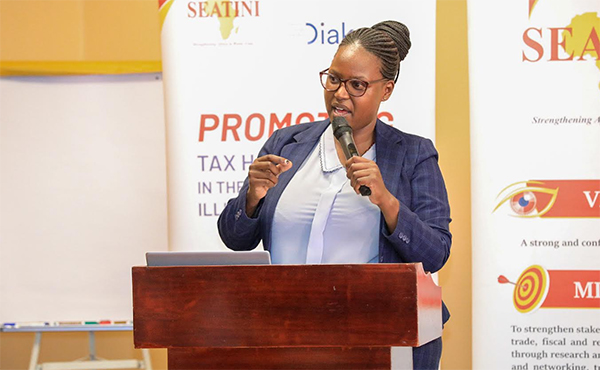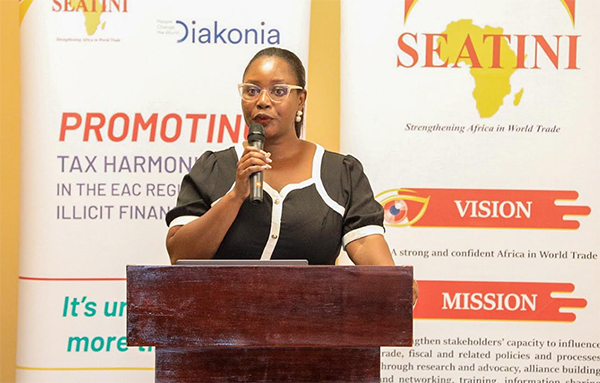
Why CSOs are warning of looming crisis in EAC and SADC
ANALYSIS | RONALD MUSOKE | Civil society organisations have warned governments in the East African Community and the Southern African Development Community (SADC) to act fast to tackle the growing menace of illicit financial flows in the two regional economic blocs.
According to the CSOs, recent data underscores the significant revenue losses across East Africa due to illicit financial flows and related activities.
Uganda, according to a 2022 United Nations Conference on Trade and Development (UNCTAD) report suffers losses exceeding US$ 700 million (Approx. Shs2.6 trillion) annually due to illicit financial flows, while Tanzania loses an estimated US$ 1.4 billion, and Kenya an estimated US$ 10.7 billion or 8.3% of government revenue.
The Global Financial Integrity, a Washington D.C-based thinktank, defines illicit financial flows as the illegal movement of money or capital from one country to another. It notes that the money crossing borders is illegally earned, transferred or utilised.
Estimates from the United Nations Economic Commission for Africa (UNECA), show that African countries lose between US$50-80 billion annually to illicit financial flows. The root causes of illicit financial flows are multi-faceted; including tax evasion and avoidance, money laundering, informal trade (such as smuggling), abuse of Double Taxation Agreements (DTAs), and capital flight. The fraudulent practices are by both domestic firms and multinational corporations.
Unless these threats are tackled quickly, the ambitious government plans to ramp up domestic revenue mobilisation will remain a distant dream, said the group of civil society organisations (CSOs) that met in Uganda’s lakeside town of Entebbe from December 10-12, 2024.
They were meeting to dialogue on the impact of illicit financial flows on domestic revenue mobilization under the theme “Promoting Accountable, Equitable, and Inclusive Domestic Resource Mobilization Systems in the EAC and SADC Regions.”
According to civil society, illicit financial flows and the escalating debt burden are threatening the ability of the two economic blocs to mobilise resources for social services, drive long-term national development and fulfill regional commitments to achieve the Sustainable Development Goals (SDGs).
“The challenges the countries are grappling with are also responsible for eroding economic stability, state sovereignty, and future development prospects in the EAC and SADC.
“These activities have facilitated the outflow of vast sums of much-needed resources that could otherwise be used to invest in the well-being of citizens, stimulate economic growth, and support critical sectors such as healthcare, education, infrastructure development, and access to clean water,” noted a joint statement issued after the three-day dialogue.
According to the CSOs, the financial hemorrhage is a significant obstacle to achieving the sustainable development goals, due to the growing financing gap that cannot be addressed by the foreign aid the countries in the two blocs receive. The resources could otherwise support public service delivery and human capital development, and industrial investments.
The two economic blocs remain vulnerable to revenue leakages facilitated by weak regulatory framework, inadequate domestic tax policies to address the evolving landscape of the digital economy, limited technical and human capacity to enforce international tax practices, and loopholes in the global tax governance framework that allow multinational and wealthy individuals to exploit the inconsistences within domestic tax systems.
Nelly Busingye, the head of partnerships and institutional learning at Tax Justice Network Africa, a pan-African network that brings together over 50 CSOs across 26 countries noted during the dialogue that it is important for the governments in the two blocs to decisively deal with the challenge of illicit financial flows because foreign aid appears to be dwindling due to the political headwinds that are sweeping across Europe and America.
“External funding and assistance is going to reduce, if it has not already reduced, whether we want it or not,” she said, “So, governments such as Uganda’s will have to increase their budgets and 90% should come from resources that are domestically mobilised.”
The CSOs who came from Uganda, Kenya, Tanzania, Rwanda, Burundi and Zimbabwe came up with actionable strategies to curb the illicit financial flows and enhance domestic revenue mobilisation efforts.
The strategies, rooted in tax justice and prudent debt management, are important to ensuring accountable, equitable, and inclusive domestic revenue mobilisation systems (frameworks) in the EAC and SADC sub-regions, noted the civil society representatives.

Kenneth Natukunda, the head of monitoring and intelligence at the Financial Intelligence Authority (FIA), Uganda’s anti-money laundering and terrorism financing watchdog, noted during the dialogue that financial crimes such as money laundering, tax evasion, corruption, and trade misinvoicing are increasingly being used to enable the illicit movement of money across borders. This, he said, is eroding the country’s economic and governance structures.
He said the most important proceed-generating crimes in Uganda are; corruption, fraud (cybercrime), obtaining money by false pretence, visa fraud, identity theft, and pyramid schemes.
Natukunda noted that banking, real estate, forex bureaus, casinos, lawyers, dealers in precious metals, money transfer services, virtual asset service providers are sectors that FIA has identified as conduits and enablers of financial related crimes in the country.
Sheila Laker, a tax crimes investigations officer at the Uganda Revenue Authority said tax evasion ranges from not filing one’s taxes at all to misstating what they are filing.
She pointed at Value Added Tax fraud and money laundering, where entities do not declare what they have sold or bought and hide the tax that they should have remitted.
Tax incentives and exemptions
In their hunt for foreign direct investments, many governments in the two blocs continue to compete among themselves while offering unproductive tax incentives and exceptions that have failed to translate into the economic benefits (growth) envisioned at the time of the award.
Studies on tax competition within the EAC region by Tax Justice Network – Africa indicate these incentives have been found to contribute to very large revenue losses for governments. Recent tax expenditure reports within the East African Community reveal that Kenya loses KShs 510.56 billion, Uganda forfeits close to UShs 3 trillion, Tanzania TShs 3.08 trillion, and Rwanda RWF 556.3 billion.
These losses, according to civil society, undermine efforts by the EAC member states to achieve the 25% tax-to-GDP ratio set under the Monetary Union Protocol. They limit their ability to mobilise resources, reflect weakness in the tax administration, and contribute to the overreliance on external financing.
Ronald Nyenje, Manager Tax Expenditure and Policy Analysis at the Uganda Revenue Authority noted that during the 2023/24 financial year, the government forwent Shs 166 billion in tax exemptions to the investors.
But, he said, the government does not consider the exemptions as “losing out on revenue” because of the benefits that eventually accrue from the decision.
“It’s not losing, but foregoing, because we are intentionally giving out these exemptions. For example, in the 2023/24 financial year when you look at the benefits in the initial stages, we are foregoing Shs 166 billion, but we are getting Shs1.1 trillion collected from income tax, local excise duty payers who earn value-added tax, withholding tax, and other fees,” he said.
Debt trap
However, according to the CSOs, the rising debt level in East and Southern Africa is a growing concern with significant impact on local revenue mobilizstion, due to high debt servicing obligations taking a significant toll on domestically generated revenues.
For instance, Uganda’s 2024/2025 national budget projects a revenue collection of Shs 32 trillion (Approx. US$ 8.5 billion), but the country’s debt servicing requirement stands at Shs 34 trillion (about US$ 8.9 billion). This means that debt repayments are outpacing revenue collection, leaving little to no fiscal space for investments that would drive long-term development.
In order to cope with meagre local revenue collections, countries in both the EAC and SADC are increasingly turning to non-traditional creditors at much higher interest rates which is further compounding the debt burden.

This trend is reflected in the rising debt-to-GDP ratios in several EAC and SADC countries. For example, Zambia’s debt-to-GDP ratio surged to over 130% in 2023, one of the highest in sub-Saharan Africa, highlighting the need for urgent debt restructuring.
With foreign aid declining and the borrowing space becoming constrained, countries face severe limitations in pursuing long-term development strategies. This leaves very limited room for meeting SDGs and application of innovative public-policy solutions to Africa’s rapid-development needs.
The UNCTAD World Investment Report (2024) has already cautioned that the growing reliance on private creditors makes it harder for governments to focus on long-term development projects.
John Oduk, a Policy Assistant at the Nairobi-based African Forum and Network on Debt and Development (AFRODAD) blamed the growing debt problem on the ambitious plans of regional governments to transform their economies.
“Many of the countries have been forced to borrow to do intensive infrastructural developments,” he said, “This is putting the region’s long term economic stability at risk because with all this debt comes the issue of debt servicing and what we have to take note of is that every dollar or shilling that is put aside for debt servicing is a shilling or dollar less for financing development in our countries.”
Corruption remains a barrier
However, corruption also remains a significant barrier to effective local revenue mobilisation in both regions as borrowed funds are often mismanaged or diverted to non-productive uses, undermining the intended development outcomes.
Weak institutional frameworks, limited public accountability, and inadequate political goodwill and bureaucratic commitment exacerbate corruption and opacity in public debt management. Many countries lack robust oversight mechanisms and political goodwill to curb the vice.
The lack of transparency in debt management and resource allocation also makes it difficult for citizens to hold their governments accountable and the CSOs want greater public access to debt information, improved budget transparency, and public participation in decision-making processes. They say this will ensure resources are used in ways that benefit the wider population and not just elite interests.
The civil society representatives noted that the fight against illicit financial flows calls for financial system reforms, and the challenges posed by unsustainable debt require greater collaboration across borders.
The CSO say there is urgent need to adopt alternative strategies to address the growing debt crisis and damaging IFFs including capacity building, debt swaps, restructuring, and renegotiation mechanisms.
“Regional tax harmonization efforts are essential to reduce tax evasion and capital flight; strengthening tax administration, enforcing multilateral tax agreements, and creating fairer tax environments are crucial to mobilizing domestic resources more effectively.”
The CSOs want annual regional presidential roundtables, at EAC and SADC levels, to discuss serious policy adaptations and innovations that can address illicit financial flows and debt burdens facing both regions.
They also want stricter regulation of international financial transactions and trade flows, improvements of debt management practices, and expansion and access to information and promotion of public participation in decision-making processes related to budgeting, debt acquisition, and resource allocation.
This, they say, should be done through enhancement of the capacity of regional CSOs to engage effectively with governments and international organisations to influence domestic revenue mobilization policies, reduce illicit financial flows, and address unsustainable debt challenges.
“There is need to undertake bold industrial policies that are intended to reclaim national- and regional-level controls over entire value chains for critical minerals and other extractives, in order to maximize public-revenue generation and other development benefits from the exploitation of our natural resources.”
“Only by addressing the root causes of illicit financial flows and promoting sound fiscal management can the region secure the resources necessary to drive sustainable development and improve the livelihoods of its people.”
“A coordinated effort among civil society, governments, and international partners is essential to create a more transparent, accountable, and equitable financial system that will enable both sub-regions to mobilise resources effectively and invest the same for the benefit of their populations,” noted the CSOs.
 The Independent Uganda: You get the Truth we Pay the Price
The Independent Uganda: You get the Truth we Pay the Price



